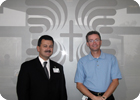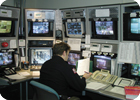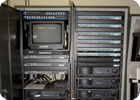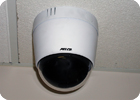My Turn: Assembling a System

Nicholas Kowal (left) of Resurrection Health Care and Michael Casey (right) of Initial Electronics worked together to create an access control system to suit the hospital''s needs.
What is your day-to-day operation?
Kowal: My day-to-day operation has standardization to it, and essentially involves keeping order at nine Chicago area hospital sites. I oversee and am in constant communication with seven managers (two of the managers oversee two locations, the rest one location). They rely on me to be the support person. Of course, there’s always the wrench thrown into the day-to-day operation to keep you on your toes.We also create a strategic plan every two years. We meet to figure out goals and strategies as well as investigations in order to better our locations, and try to fit a budget.
What have been some challenges?
Kowal: I have been in the security industry for 27 years, beginning as a security officer and held a corporate position for six years. Initially, there were different types of proprietary systems that were difficult to incorporate. I evaluated systems and found a lot of proprietary ones, and wasn’t happy with that. I looked for a solution.Initial Electronics presented us with a system, and we ran it at one site, and it had a flawless run for one year. It’s a different product in that it will have standardization and it is going to be accessible from one site only--my computer.
Identifying what was the right fit for us provided us with a good product and worked out really well.
Casey: We began at certain hospitals and proved ourselves there and slowly worked our way into all their facilities within the next 2-3 years. Nick and I and other managers decided how the system should function. Initial Electronics engineered all the systems. Together, we developed standards with a particular look. We decided on certain cameras--indoor domes and exterior cameras.
Kowal: What we do is group-decided, counsel-decided and so it’s a concerted effort. If I think something’s great and they [counsel members] don’t like it, I won’t keep it. It’s all about collaboration.
What prompted the revamping of the access system?
Kowal: At an open campus, thefts are an issue and you can’t turn to containment; you have to let your visitors be free to come and go. A heightened alert screening process ensures the safety and well being of patients, visitors and workers. We watch to mostly contain inside thefts or property crimes, and do not have many assaults. Our last system had lots of flaws in it and we needed a standard platform.What has been included in the upgraded system?
Kowal: Some of our hospitals are phasing out their current systems, due to budgetary constraints. We concentrated on access control mostly. We plan to use proximity at all nine locations.Casey: The entire version resides on the network. We have established a close partnership with IT. This allows for standardization and access online, which is something Nick was looking for.
We decided on automatic trailing, which helps better designate access. It also features the ability to access site-specific database software on Resurrection’s servers. The thing that I like about it is one point--one database.

SIDEBAR: Productive Partnering: Resurrection Health Care and Initial Electronics
Twenty-seven years ago, Nicholas Kowal began his career in the security industry and worked his way up to the top. His leadership and integrity to be the best began his search for a system overhaul.

Looking for a reprint of this article?
From high-res PDFs to custom plaques, order your copy today!




